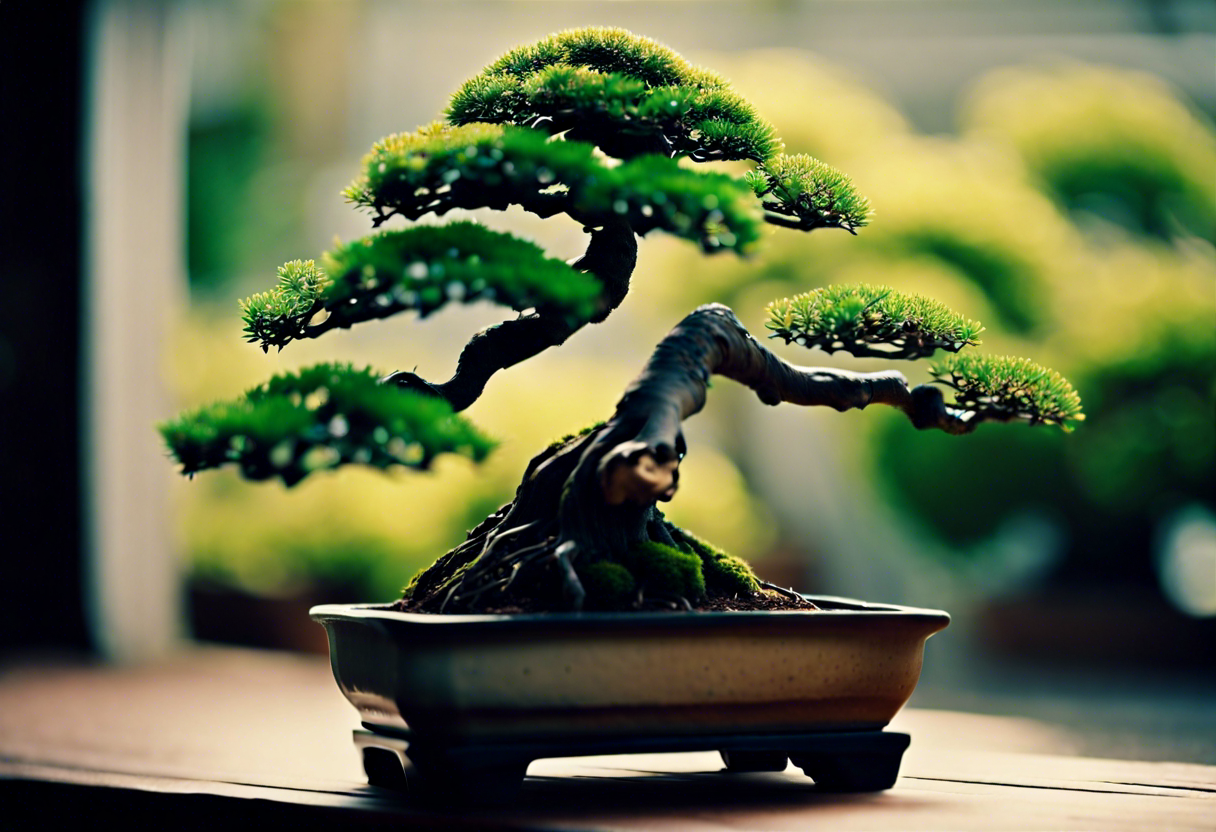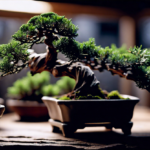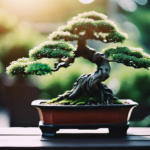The Cost Factors That Determine How Much a Bonsai Tree Is Worth
When considering the cost of a bonsai tree, several factors come into play that ultimately determine its value. Understanding these factors can help you gauge how much you can expect to pay for a bonsai tree.
Age and Size: One of the primary factors that influence the price of a bonsai tree is its age and size. Older bonsai trees that have been carefully pruned and trained over many years command higher prices due to the time and effort invested in their cultivation. Larger bonsai trees also tend to be more expensive as they require more space, care, and maintenance to keep them healthy and thriving.
Species and Rarity: The type of tree species used for bonsai cultivation can significantly impact its price. Certain species are more popular and easier to grow, making them more affordable, while rare or exotic species can fetch a premium price. Additionally, the rarity of a particular bonsai tree variety can increase its value among collectors and enthusiasts.
Artistic Quality: The artistic quality of a bonsai tree, including its shape, style, and overall aesthetic appeal, plays a crucial role in determining its worth. Bonsai trees that exhibit a high level of artistry, such as intricate wiring, well-defined branches, and balanced proportions, are usually priced higher than less refined specimens.
Pot and Presentation: The pot in which a bonsai tree is planted and its overall presentation also contribute to its value. Handcrafted, aesthetically pleasing pots made from quality materials can enhance the beauty and value of a bonsai tree. Additionally, bonsai trees displayed in an attractive manner, such as on a bonsai stand or in a decorative setting, may be priced higher than those without such presentation.
Seller Reputation: The reputation of the seller or bonsai nursery from which you purchase a tree can impact its cost. Established nurseries known for their expertise, quality of trees, and customer service may charge higher prices for their bonsai trees compared to less reputable sellers.
The cost of a bonsai tree is determined by a combination of factors, including age, size, species, artistic quality, pot, presentation, and seller reputation. By considering these factors, you can better understand how much a bonsai tree is worth and make an informed decision when purchasing one.
Learn more about bonsai tree pricing and selection
Popular Varieties of Bonsai Trees and Their Price Range
When it comes to the world of bonsai trees, there is a wide array of popular varieties that enthusiasts can choose from. Each type of bonsai tree has its unique features, growth patterns, and maintenance requirements, which often influence its price range. Understanding the different popular varieties can help enthusiasts make an informed decision when selecting a bonsai tree that fits their preferences and budget.
Japanese Maple (Acer palmatum): Known for its vibrant foliage that changes color throughout the seasons, the Japanese Maple bonsai tree is a popular choice among bonsai enthusiasts. The price range for a Japanese Maple bonsai tree typically starts from $30 for young saplings and can go up to $500 or more for mature specimens with intricate branching and advanced age.
Chinese Elm (Ulmus parvifolia): The Chinese Elm bonsai tree is valued for its small, dark green leaves and beautiful curved trunk. This variety is relatively affordable, with prices ranging from $25 for starter plants to $250 for well-established bonsai trees that have been meticulously trained over the years.
Juniper (Juniperus): Juniper bonsai trees are a favorite among beginners due to their hardy nature and forgiving growth habits. Prices for Juniper bonsai trees vary depending on factors such as age, styling, and pot quality, but they generally range from $20 for young plants to $300 for older, more refined specimens.
Ficus (Ficus retusa): Ficus bonsai trees are prized for their glossy, dark green leaves and strong root systems. The price of a Ficus bonsai tree typically ranges from $30 for small, starter plants to $400 for mature specimens that have been expertly styled and cared for.
Pine (Pinus): Pine bonsai trees are known for their rugged appearance and characteristic needle-like foliage. Prices for Pine bonsai trees can start from $50 for young plants and go up to $500 or more for well-developed specimens with thick trunks and intricate branch structures.
The price range of bonsai trees can vary significantly depending on factors such as species, age, size, styling, and overall aesthetic appeal. It is essential for enthusiasts to explore different varieties, consider their preferences, and budget constraints before making a purchase decision. Additionally, proper care and maintenance are crucial in ensuring the longevity and health of a bonsai tree, making it a worthwhile investment for those passionate about this ancient art form.
To explore a wide selection of bonsai trees and accessories, visit Bonsai Outlet.
Factors to Consider When Pricing a Bonsai Tree for Sale
When determining the price of a bonsai tree for sale, several factors come into play. These factors can significantly impact the value of a bonsai tree and how much you can ask for it. Understanding these elements can help you price your bonsai tree appropriately and attract potential buyers.
1. Age and Maturity: The age and maturity of a bonsai tree are crucial factors in pricing. Older bonsai trees that have been carefully cultivated and trained over many years tend to command higher prices due to their intricate shapes and well-developed aesthetic qualities.
2. Species and Rarity: The type of tree species also plays a significant role in pricing. Some species are more sought after by bonsai enthusiasts, leading to higher price tags. Additionally, rare or unique species that are not commonly found in the market can fetch premium prices.
3. Size and Proportions: The size and proportions of a bonsai tree can influence its price. Larger bonsai trees typically cost more than smaller ones, as they require more time and effort to shape and maintain. Trees with well-balanced proportions and pleasing aesthetics also tend to be valued higher.
4. Health and Condition: The overall health and condition of a bonsai tree are essential factors in determining its price. Healthy trees that are free from pests and diseases will be more valuable than those that require extensive care or treatment.
5. Artistic Value: The artistic value of a bonsai tree, including its styling, branch structure, and overall design, can influence its price. Trees that exhibit exceptional artistic quality and craftsmanship are likely to be priced higher than those with less intricate designs.
By considering these factors when pricing a bonsai tree for sale, you can better assess its worth and set a competitive price that reflects its quality and appeal to potential buyers.
For more information on pricing bonsai trees and maximizing their value, you can visit Bonsai Empire.
Tips for Budget-Friendly Bonsai Tree Shopping
When it comes to starting your bonsai tree collection without breaking the bank, there are several strategies you can employ to make budget-friendly purchases. Here are some tips to help you find affordable bonsai trees without compromising on quality or beauty:
-
Buy Young Trees: Young bonsai trees are generally more affordable than older, more mature trees. While they may require more time and effort to shape and train, starting with a younger tree can be a cost-effective way to begin your bonsai journey. Websites like Bonsai Outlet offer a wide selection of young bonsai trees at competitive prices.
-
Attend Local Bonsai Events: Local bonsai shows, markets, and workshops are excellent places to find budget-friendly bonsai trees. At these events, you can often purchase trees directly from growers at lower prices than you would find at retail outlets. Additionally, you can benefit from expert advice on caring for your new purchase.
-
Consider Pre-Bonsai Material: Another cost-saving option is to purchase pre-bonsai material, such as nursery plants or raw material, that can be shaped into bonsai trees over time. While this option requires more patience and expertise, it can be a rewarding and economical way to acquire unique and beautiful bonsai specimens.
-
Shop Online: Online retailers offer a wide range of bonsai trees at various price points, allowing you to compare prices and find the best deals. Look for reputable online bonsai nurseries like Bonsai Boy or Brussel’s Bonsai that provide detailed descriptions and care instructions for each tree.
-
DIY Bonsai: For the ultimate budget-friendly option, consider creating your own bonsai tree from scratch. Collecting plant material from your garden or a local nursery and learning the art of bonsai styling can be a cost-effective and fulfilling way to develop your bonsai collection. Websites like Bonsai Empire offer tutorials and resources for beginners interested in creating their own bonsai trees.
By implementing these tips, you can embark on your bonsai journey without overspending. With careful consideration and creativity, you can build a stunning collection of bonsai trees while staying within your budget. Remember that bonsai cultivation is not just a hobby but a lifelong journey of learning and appreciation for the art of miniature trees.
The Investment Value of Owning a Bonsai Tree
When considering the investment value of owning a bonsai tree, it’s essential to look beyond the initial cost and appreciate the long-term benefits that come with nurturing these miniature trees. While the price of a bonsai tree can vary depending on various factors, such as age, species, and aesthetic appeal, the true value lies in the cultural significance, therapeutic benefits, and potential for appreciation over time.
Bonsai trees have been cultivated for centuries in Japan and other parts of the world, symbolizing harmony, balance, and patience. Owning a bonsai tree is not just about having a decorative houseplant; it is about forming a connection with nature and embracing the principles of bonsai artistry. The process of shaping and caring for a bonsai tree can be a meditative practice that promotes mindfulness and reduces stress.
In terms of financial investment, while some rare and ancient bonsai trees can fetch exorbitant prices among collectors and enthusiasts, the real value of owning a bonsai tree lies in the personal satisfaction and joy it brings. Watching a bonsai tree thrive and mature under your care can be a deeply rewarding experience that transcends monetary worth.
Moreover, bonsai trees have the potential to appreciate in value over time, especially if they are well-maintained and trained to perfection. Just like any other living artwork, a healthy and aesthetically pleasing bonsai tree can become more valuable as it ages, making it a unique and timeless piece of natural art that can be passed down through generations.
While the initial cost of purchasing a bonsai tree may vary depending on factors like size and species, the investment value of owning a bonsai tree goes far beyond mere monetary considerations. The cultural significance, therapeutic benefits, and potential for appreciation over time make owning a bonsai tree a truly enriching experience that can bring beauty, tranquility, and a sense of connection to nature into your life.
For more information on the value of bonsai trees, you can check out Bonsai Empire for insights into the art and practice of bonsai cultivation.
Conclusion
The cost of a bonsai tree can vary significantly based on several factors that determine its worth. Factors such as age, size, species, and the skill of the bonsai artist can all influence the price of a bonsai tree. Understanding these cost factors can help you make an informed decision when purchasing a bonsai tree.
When it comes to popular varieties of bonsai trees and their price range, there is a wide selection to choose from. Some common types include the Juniper bonsai, Ficus bonsai, and Japanese Maple bonsai. Prices can range from affordable options for beginners to more expensive, rare species for collectors.
When pricing a bonsai tree for sale, it is crucial to consider factors such as the tree’s age, size, styling, and overall health. Ensuring that the tree is well-cared for and aesthetically pleasing can justify a higher price point. Additionally, highlighting the unique characteristics and history of the bonsai tree can add value to its selling price.
For those looking to shop for bonsai trees on a budget, there are several tips to keep in mind. Some budget-friendly options include purchasing pre-bonsai starter plants, attending bonsai shows or auctions, or buying from local bonsai nurseries. With a bit of research and patience, you can find affordable bonsai trees that meet your preferences and budget.
Owning a bonsai tree can be more than just a hobby; it can also be a rewarding investment. Bonsai trees have a timeless appeal and can potentially increase in value over time, especially if well-maintained and carefully cultivated. Investing in a high-quality bonsai tree not only offers aesthetic enjoyment but also the potential for long-term financial gain.
The world of bonsai trees offers a diverse range of options for enthusiasts at every level. By understanding the cost factors, exploring popular varieties, considering pricing strategies, shopping smartly on a budget, and recognizing the investment value, you can embark on a fulfilling journey of owning and caring for these exquisite living works of art. Whether you are a seasoned bonsai collector or a beginner looking to start your bonsai adventure, the beauty and allure of bonsai trees are sure to captivate you for years to come.


